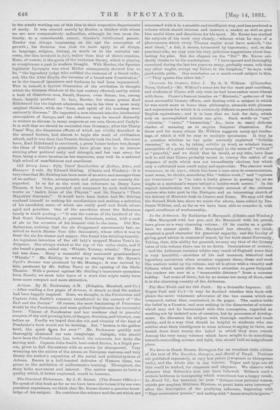Ciceronis De Orators, Libor I. By A. S. Wilkins. (Clarendon
Press, Oxford.)—Mr. Wilkins's notes are for the most part excellent, and students of Cicero will only wish he had been rather more liberal with thorn. Cicero's famous treatise on " Rhetoric," quite one of his most successful literary efforts, and dealing with a subject in which ho was much more at home than philosophy, abounds with phrases and expressions for which it is extremely difficult to provide adequate English equivalents ; and it is hero that we look for help, which only an accomplished scholar can give. Such words as "ars," " scientia," "ratio," " humanitas," 6::c., have so many delicate shades of meaning as to require frequent illeetratiou. For those and for many others Mr. Wilkins suggests many apt render- ings, of which it will be easy to multiply specimens. It may be a question whether ho has quite correctly explained " Sulatilis venustas," in ch. v., by taking subtilis (a word, as scholars know, susceptible of a great variety of meanings) in the sense of " refinad " or " graceful," and we think that he would, at any rate, have 'done well to add that Cicero probably meant to convey the notion of An elegance of style which was not immediately obvious, but which 11 only a cultivated man could enjoy and appreciate. The obscure word transenna, in ch. xxxv., which has been a sore crux to commentators, must mean, ho thinks, something like " lattice-work ;" and " aspieere per traneennam" is "to take a hasty glance in passing by, as we might at a merchant's wares behind a lattice-work screen." In his capital introduction we have a thorough account of the eminent orators who take part in the Dialogue, and an interesting sketch of the history of Rhetoric both in Greece and Remo. We may add that the Second Book has, since wo wrote the above, been edited by Pro- fessor Wilkins, and, as far as we have been able to examine it, with equal excellence of workmanship.






































 Previous page
Previous page